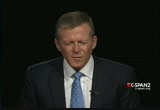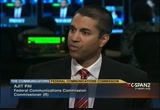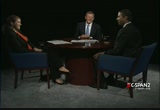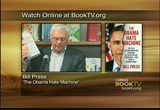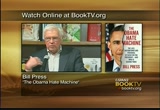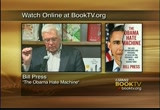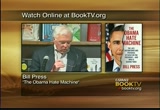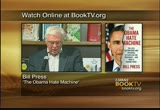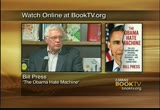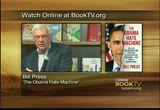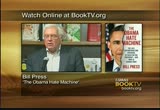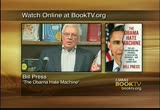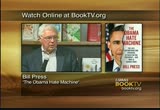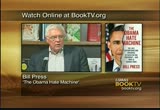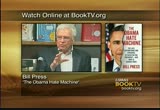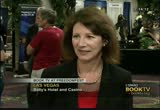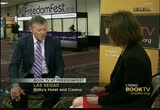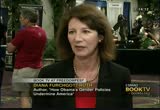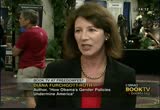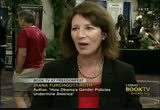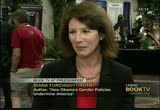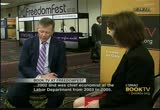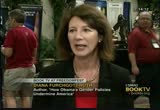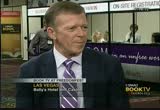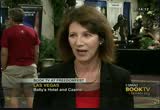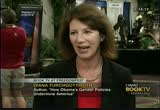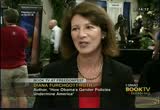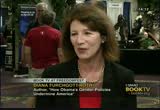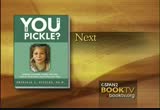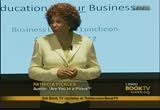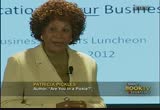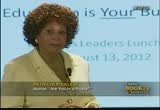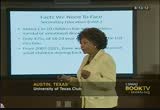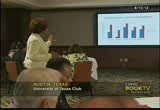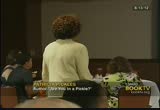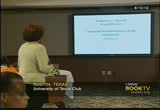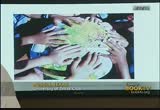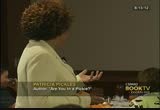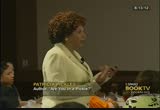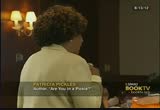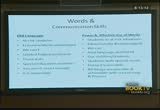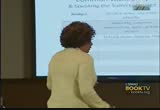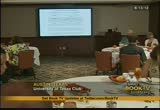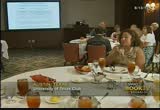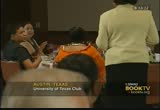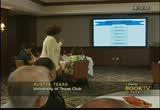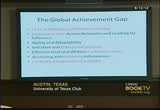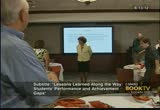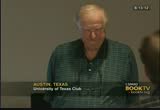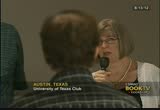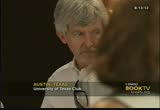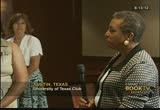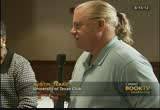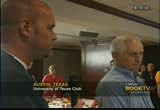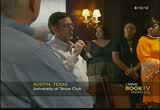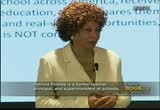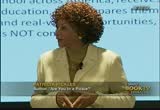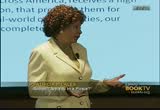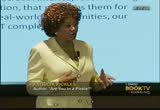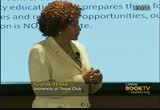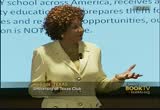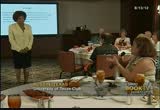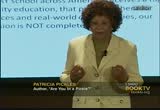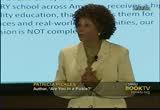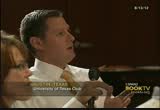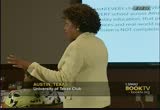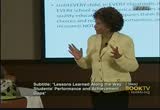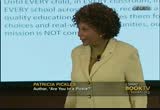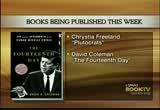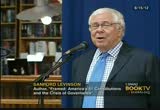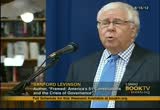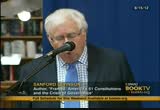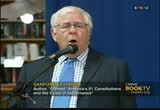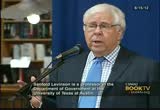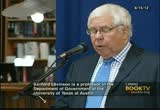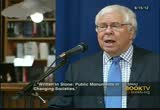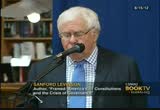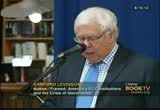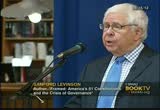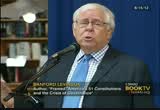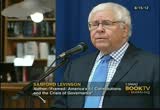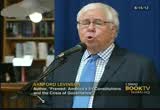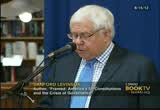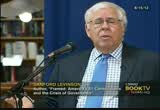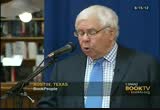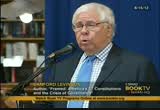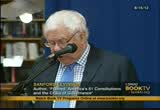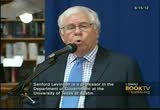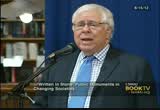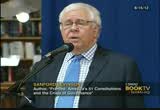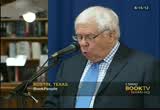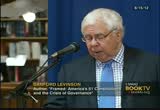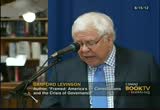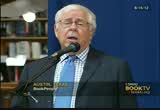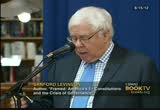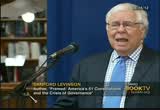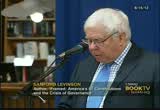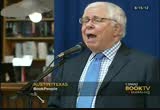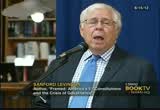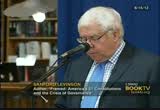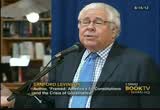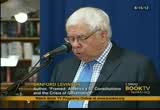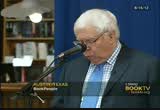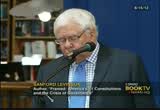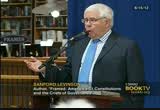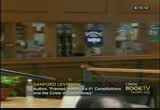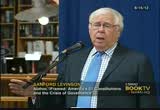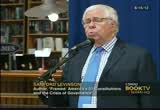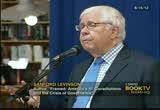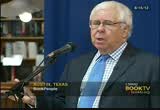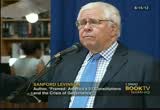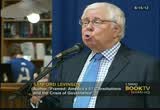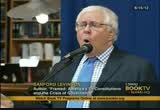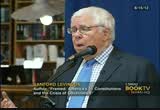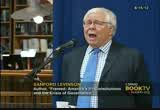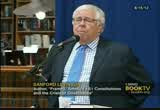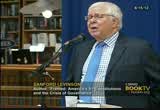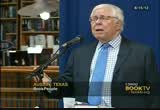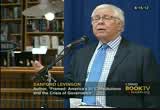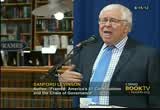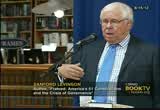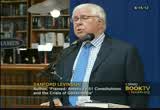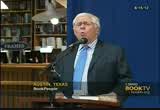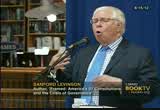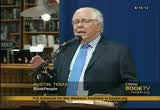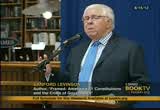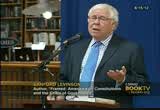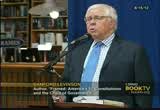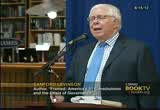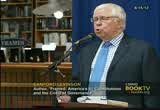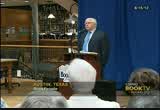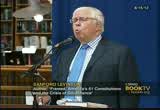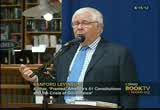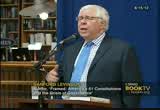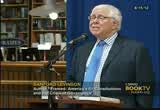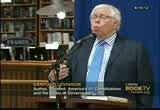tv Tonight From Washington CSPAN October 8, 2012 8:30pm-11:00pm EDT
8:30 pm
>> guest: well, i hope it doesn't portend that innovation and investment in this industry is slowing down. that is the lifeblood of this industry. and i know that there are a lot of interesting initiatives on capitol hill that have been proposed to make sure that that doesn't happen. i know that senator moran and senator warner, for example, have introduced the start-up act 2.0 that would take a number of different measures to incentivize greater investments for start-ups in particular. and to the extent that there's something the fcc can do to make sure that there continues to be a vibrant venture capital industry, i'm happy to support that. >> host: do you think washington pays enough attention to silicon valley? >> guest: um, i think it is quite often the case that washington and silicon valley don't really think of each other all that much. when i was in silicon valley, a
8:31 pm
lot of people expressed concerns about spectrum, for example, but they didn't really think the fcc was interested in doing much about it or could do much about it. conversely, here in washington i often hear that people in silicon valley don't understand the legacy frameworks of the communications act that we have to operate under, and so it's -- you sort of have two different conversations going past each other. even though we all share the same goal of maintaining a dynamic industry. so part of the reason that i went to california is to understand what drives innovation and investment in this industry, but also to hear from them about ways that washington could be more engaged to make sure that our decisions, you know, both reflect the nature of the business and help them do what they do even better. >> host: final question, eliza krigman. >> let's talk about the politics at the fcc. do you feel any pressure to be more conservative than commissioner mcdowell, and do you consult with one another about a team approach on the
8:32 pm
issues? >> guest: i don't feel any pressure one way or the other. i can tell you we've never had any conversation like that, nor have i had a similar conversation about small p politics with any of my colleagues. it's remarkable how well we work together. the vast majority of our work is done on a bipartisan, consensus basis, and when we do have concerns, tease are issues where reasonable people can disagree, and we approach the disagreement in that way. and so i've been very fortunate to have four colleagues who are blessed with both a deep understanding of communications issues and with a collegial manner, because that makes my work at the commission that much easier. >> host: ajit pai is the newest republican commissioner on the federal communications commission. eliza krigman is with "politico." thank you both for being on "the communicators." >> guest: thank you very much for having me. >> thanks so much. >> let me just say, i think we can sumco up -- this is a very timely book. i hope you enjoy it.you it's, um -- i think it can be t
8:33 pm
summed up in really one sentence -- seldom if ever, in history have we seen vicious attacks directed against the president of the united states. you add those three elements together, and you get the obama hate machine. so i'd just like to say a little bit about each of those elements and open it up for questions until c-span tells us the cameras are turned off. and let's start at those directed against obama. i think criticism of obama --
8:34 pm
[inaudible] and every day in front of the white house on pennsylvania avenue there's a crowd of people protesting something, you know? and i love that, i really do. i always make a point of checking out what they're there for, what the issue of the day is. it's a very healthy part of our democracy. and criticism of presidents, of course, has been around for a long time. if you want to go back to the ugliest presidential campaign in history, you could probably go back to 800 and john adams -- 1800 and john adams and thomas jefferson. particularly the followers against each other. so, um, but with president obama it's been attacks not on his policies so much as on him as a person. and we haven't seen that, i don't believe -- and i went back and did a lot of research in presidential campaigns and presidential history -- we haven't seen that severe that
8:35 pm
ugly directed against any president, pardon me, since abraham linson. we think -- lincoln. we think of lincoln, of course, as st. abraham. he wasn't thought of that way during his lifetime. it was only after he was assassinated. when he came to washington, he was bro deuced to the nation by the -- introduced to the nation by the kentucky statesman as follows: abraham lincoln is a man above the medium height. he passes the six-foot mark by an inch or two. he is raw-boned, bow-legged, knock-kneed, pigeon-toed, slob-sided, a shapeless skeleton in a very tough, very dirty unwholesome skin. his lips protrude beyond the natural level of the face but are pale and smeared with tobacco juice, his teeth are filthy. [laughter] peat your president, your new president of the -- meet your president, your new president of
8:36 pm
the united states. [laughter] at the same time, another paper published this profile of mr. lincoln. mr. lincoln stands six feet tall in his socks which he changes once every ten days. [laughter] his anatomy is composed mostly of -- [inaudible] and when walking, he resembles the offspring of a happy marriage between a derrick and a windmill. [laughter] his head is shaped something like a rue that bag georgia. he can hard by be called handsome -- hardly be called handsome, though he is certainly much better looking since he had the smallpox. [laughter] flash forward. president obama called a racist, a marxist, a fascist, a dictator, a muslim -- that's not meant as a positive term, by the way, man of faith, meaning
8:37 pm
terrorist -- a nazi, a foreigner, a jackas is -- jack an ass, rush limbaugh, a liar and a socialist. this obsession with obama as a person is what others have called and the phrase i look in the book as the otherring of president obama. they have to kind of prove that he's not like us. and a lot -- some of it, not all of it, but some of it, of course, is the color of his skin can. he's black, and we're white, he's the first african-american president. but it's also he's not a true american, the whole birth certificate nonsense, all to show that he is, again, something different, something else, something foreign. it's, it's really obsession w as i say, to try to destroy barack obama personally. david horowitz, one of the most conservative commentators out there, actually calls this -- he
8:38 pm
himself calls in the obama derangement syndrome. today just can't help themselves -- they just can't help themselves. i don't know how many of you heard about this. it goes on. last week the leading federal judge in montana sends out an e-mail on his official judicial e-mail account to his friends this joke about, um, little barack obama asking his mommy, you know, why am i black and you're white, and she says, well, for all i know about your father, i'm surprised he didn't bark when we had sex, meaning having sex with a dog. he did this on his official federal e-mail, and he said, you know, i don't usually send jokes out to friends, but i just thought this one was particularly funny. i mean, that's how sick these people are, and that's what we have seen over and over again. again, directed not so much against -- you can disagree with president obama's health plan, that it wasn't strong enough or
8:39 pm
that it's government takeover of health care, you can disdegree with him on taxes or whatever, but this is against him personally and trying to destroy and discredit him personally. the obama hate machine. and it's not just fox news. it's out there because of a couple of people that most americans have never heard of, the famous koch brothers, charles -- now-famous, charles and david coke. david koch. and, again, we've seen corporate-sponsored attacks against presidents before, particularly, and i outline two of them, franklin delano roosevelt. by the way, with him it was the dupont brothers, and there were free of those at the -- three of those at the time. formed the liberty league to deny fdr a second term. and then with bill clinton, of course; was richard melon safe who funded all the investigations that led to paula jones and on and on, and the
8:40 pm
articles in the american spectator. but nothing compared to the money and the organization that we've seen on the part of charles and david koch who are the heads of koch industries, they are the third and fourth richest men in america, people in america, both men. we know about bill gates and warren buffett, but these are number three and number four. combined wealth of $50 billion. they have put more money in -- by the way, i have to say this, they do some good things, particularly david koch who is the wealthiest man in new york city. you thought michael bloomberg was. no, it's david koch. but he funds the metropolitan opera, big supporter of it. the metropolitan museum of art, cancer research centers around the country. but most of their money goes into political activities, and they are everywhere.
8:41 pm
the heritage foundation in washington, d.c., koch brothers. the cato institute when it started, koch brothers. some of you may know now the koch brothers -- cato kind of went its own independent way, and the koch brothers are now suing the cato institute to get it back to be a totally controlled koch brothers' operation. people, americans for prosperity, the most active political organization today, all funded by the koch brothers. freedomworks, dick armey's organization, koch brothers. john kasich in ohio, koch brothers' candidate. bought lock, stock and barrel by the koch brothers. same with scott walker in wisconsin. everywhere. in california a couple of years ago there was a measure, prop 23 on the ballot, to repeal the clean, new clean car standards put in by arnold schwarzenegger. that measure to repeal those standards -- which lost, prop
8:42 pm
23 -- totally funded by the koch brothers. legislation in west virginia to overturn the new mining safety rules that were put if place after that last -- put in place after that last mine disaster, the effort to overturn mining safe till regulations funded by the koch brothers. i have in the book a page with 53 different organizations, a lot of them, by the way, research centers on college campuses around the country all for the purpose of disputing the existence of global warming and fighting to do away with any government regulations that would have anything to do with climate control. 57 different organizations that i was able to find that are either partially or totally funded by the koch brothers. the reach is so great that someone has called them the kochtopus -- [laughter] think of all those arms out there. and they don't do it alone. they get together twice a year with their corporate buddies from around the country and
8:43 pm
raise money for right-wing political causes. two days before the book came out i was so happy this happened because i could tell people, do you see? i'm not exaggerating, i'm not making this up. two days before the book came out they had their latest confab in palm springs, and i'll tell you who was there. sheldon edelson was there, by the way. their meetings are routinely attended by republican governors, kasich, walker, chris christie, bob mcdonnell from virginia, i'm sure rick scott, they've all been there. supreme court justices antonin scalia, of course, clarence thomas, alito, they've all been there to their meetings of these corporate chieftains, and this one two days before the book came out, so just about a month or so ago, they raised $900 million in -- $100 million in one weekend to defeat barack obama this year for president. think about that. if you look at the super pacs for romney and santorum and ron paul and newt gingrich, up until
8:44 pm
super tuesday they had spent a total for all of the candidates of $53 million. and in that one weekend they raised $100 million. so they are huge, they went out there, and they will say, and they will do anything. of course, it's a lot easier for them now since citizens united. because you cannot only raise unlimited corporate money, but you don't have to report which corporations are paying which bills. um, but they also couldn't do it without the assistance of the nation's media, and that's what drives me >> you can watch this and other programs online at booktv.org. >> host: well now joining us on booktv is author diana furchtgott-roth, and she has, in fact, several new books coming out in the summer of 2012, plus this broadside which is a maul little book -- small little book put out by encounter, "how
8:45 pm
obama's gender policies undermined america." first of all, wha ms. furchtgott-roth, what is a broadside? what is this to represent? >> guest: a broadside is just a short, easy-to-read booklet for people who don't want to read a whole book, and there are many broadsides in many different subjects ranging from taxes by my friend steve moore of "the wall street journal" to iran by my friend michael la dean, and d this one is about jend or -- gender policy. >> host: and another new book put out by aei, american enterprise institute, is "women's figures."at's >> guest: yes. that's meant to appeal to the playboy crowd. [laughter]ss >> host: an illustrative guide to the economic progress of wit women. i'm going to start with theof broadside, and i think some of the ideas are the same in bothea of these. and that is the first paragraph which is compared with men women in 21st century america live five years longer, face an unemployment rate that is lore,
8:46 pm
are awarded -- [inaudible] in other words, contrary to what feminists, lobbyists would have congress believe, girls ande women are doing very well.n ar >> guest: exactly, yes. yes. well, it's very true that women are doing better than men, and they earn about 58% of mas and bas, fewer in jail, their earnings when compared to men in the same jobs are about the same. and what we need are economic policies that help everyone. we don't need affirmative action or special programs for women. >> host: so when you hear politicians or others say women make on average 77% of what men make, what is your reaction to that? >> well, it's not true that women in comparable jobs make 77%. if you look at first-year supermarket cashiers, a man and a woman who are just hired, they make about the same.
8:47 pm
first-year associates in law firms, they make about the same. but women on average choose to work fewer hours than men even when they work full time. because, you know, full time is anything above 35 hours a week.r and women work about 12% i fewet hours. about 25% of women work part time. many women go in and out of the work force as they have children, and that on average reduces their average earnings,o but it doesn't mean that they're discriminated against. average s their average earnings, but it doesn't mean they are discriminated against. it doesn't mean if you take to women into men in the same job they don't earn the same. they do. >> what is the paycheck fairness act, and do you think it is necessary? >> the paycheck fairness act just was up again for a voting congress. it failed. it also failed when there was a democratic house senate and
8:48 pm
president and barack obama's first term. that's because it would require them to report to the government the women they have on their payroll, the men have on that there'll come how much they pay both groups. and that's an attempt of a government should try to equalize pay between groups of women and groups of men. rather than as the law holds right now, men and women in comparable jobs in the same job. so what they're trying to do is have equal pay for equal work, not equal pay for equal work, which is two very different things. there's no reason why groups of women and groups of men in the same firm should be paid the same if they have radically different jobs. look at exxon, for example, that is a group of men and oil drilling activities. it's a dirty dangerous job. you could not get me to do. you have to pay people a lot to risked their lives doing that kind of work. exxon has a group of women in
8:49 pm
communications, assistant jobs, publications. there's no reason these two groups should be necessarily paid the same. but the paycheck benefit would be moving toward requiring firms to pay men and women the same, even if they're in very different jobs. that is not paycheck fairness. that's communism. >> diana furchtgott-roth, your book, women's figures, was there a time when women were treated unfairly in the work place? >> there certainly was. there were times in the 1950s and 1960s, you can look at the ads and you can see jobs advertised at one salary for men and another salary for women. the original feminists are to be congratulated on thinking that. as many of your list is now, there were times when women couldn't even vote. there were times when women, when they get pregnant, were fired from their jobs. feminists are to be
8:50 pm
congratulated for having moved the goalposts and having changed all that, having change the culture in the workplace. but now feminists want to move the goalpost even further and say that there's discrimination, if there is no equal outcome. so there's discrimination near 50% of ceos. there's even discrimination if 50% of construction workers are not women. discrimination by 50% if names of congress on the women and that's just false because men and women make different choices in the workplace. they make different choices in education. you see more young men majoring in math and science and more young women majoring in actually gender studies, literature, fields that are not going to pay as well as math and science. then when they enter the workplace you see more women going into nonprofits. you see more women working shorter hours and you see more men and investment banks and computer science. there isn't any reason that
8:51 pm
these two groups should be paid the same if they make different choices. a man an and a woman in an investment bank, face both start at goldman sachs, those should be paid to sing. they are paid the same. if they are not there are avenues to pursue, but that's a big difference. >> what you think about the white house council on women and girls? >> well, i think the white house needs have a council on men and boys. you can see that young men have lower earnings than young women. if you look at single men and single women in urban areas, then the single men have lower earnings. you can see that there are far higher rates of voice dropping out of high school than girls. boys are getting less education now than girls. and so if the white house wants to have a council on women and girls, that's fine. as long as they have one on men and boys, too. that i think is a big laugh.
8:52 pm
but, you know, the white house is now talking about extending title ix to math and science. title ix right now on college campuses applies to sports. and under title ix, colleges have to have the same number of men and women playing college sports in proportion to their enrollment. so if 55% of their enrollment is women, 55% of the college sports lott has to go to women. they're talking about extending this to science. so that if 55% again of campuses were women, they would have to have 55% of science lots, which the white house can easily do because title ix applies to all fields of education. this would be disastrous, both for women and for america's competitiveness. because it would mean that some young men wouldn't be able to major in science, and some young women might be pressured to major in science when they didn't want to do that.
8:53 pm
>> diana furchtgott-roth is a senior fellow at the manhattan institute, a contributing editor of real clear markets.com, columnist for the "washington examiner." she served as chief of staff george w. bush's council of economic advisers 2001-2002, and served as chief economist at the labor department from 2003-2005. are you supportive of title ix when it comes in the world of sports? we just celebrated the anniversary i think, 40th anniversary or something. >> when the courts were discussing title ix, one of the message that colleges could comply with title ix was having as many just fulfilling the desires of the different groups. in other words, if they were exceeding to the requests of women playing sports, then that was fine. but the way that now courts are interpreting it is that it has to be proportional. so now supportive of title ix as
8:54 pm
regards to proportionality. it's become a court system. the fact is there are more young men who want to play college sports than young women. there have been articles in "the new york times" about how these colleges are playing games with the numbers. soy woman can be on two teams, for example, an account as two people. or a young woman can sign up to play hockey when she first enters as a freshman and then she decides she's tired and she can drop out and still be officially listed on the team. the problem is that young men are losing valuable athletic scholarships. because they can't get on the team because colleges are having to cut back on men's teams because there aren't enough women who want to play college sports. and that's a tragedy because the real problem in our society right now is not the advancement of women, but the advancement of men, especially young low income minority men who frequently only
8:55 pm
route to college which drew an athletic scholarship. >> when you hear the political phrase, war on women, what is your thought? >> well, the real war on women right now is the war against contraceptives or free contraceptives. that's just a matter of fashion. it's something that is coming up right now. women who want contraceptives have always been able to get contraception. medicaid provides free contraception for low income women. real war on women is the economic war on women. the fact that another 780,000 women aged 16 and over are unemployed in january 2000. the fact that women who want jobs can't get them because the unemployment rate is 8.2%. the fact that our economy is just going at 1.9%. the real war on women is that they can't get jobs and that their spouses and family members can't get jobs, and they are
8:56 pm
suffering with high gas prices,-prices, higher health insurance premiums, and they cannot find the ways to advance economically. >> how obama's gender policies undermine america is the name of the broadside by diana furchtgott-roth, and she rides americans live in two worlds. what is the everyday world in which they work, study, play, laugh, cry, love any. in the world women are more likely than men to succeed. women on average do better in school, but in work, better in life. women triumphant in everyday in america. the other america is a distortion constructed by radical feminists in washington politicians. these politicians make a career out of telling women that they are defeated. >> yes, that's because, by saying that women have to earn the same as men, it indeed is a lifestyle choice which is allows many women to choose a more sensible job with lower earnings or perhaps a part-time job and
8:57 pm
the feminists say that that is not sufficient, that by doing that, women are earning less than men, are making a poor lifestyle choice. just thing, the last three supreme court justices who were nominated, the last three women supreme court justices who were nominated, justice sotomayor, justice kagan, and harriet miers, was george w. bush's white house counsel them with to her nomination, those three don't have any children. they have devoted themselves full-time to the careers. and that's wonderful those who want to do it. my boss, secretary chao, doesn't have children. secretary condoleezza rice doesn't have children. but women who want of a more flexible lifestyle choice and who want to devote less time to the work and something to the family, that's a valid choice. the goal should not be to make 100% of what men make.
8:58 pm
the goal should be to have a satisfying career. the wonderful thing about america is there such a great friday of jobs available. there's part-time jobs, flexible time jobs. there's full-time jobs where you can work 60-80 hours a week and make it as an investment banker on wall street. women have all these choices, and the want to choose more flexible jobs with lower income should not be put down. they should not be made to feel as though this isn't about choice. >> we are at freedomfest in las vegas and talking with author diana furchtgott-roth. here is her most recent broadside encounter, "how obama's gender policies undermine america." her most recent book by aei press, women's figures, an illustrated guide to the economic progress of women in america. diana furchtgott-roth committee of another book coming out. what is that? >> it is called regulating to disaster, how green jobs policies demanded -- damage of america's policy. that's a focus on green jobs and
8:59 pm
alternative energy is imposing costs on america's economy. costs that the proponents of green jobs are not acknowledging. >> for the most part you write a lot about gender policies and politics, and is this a branch out for you to write about green jobs? >> i've also written, my books have been in the air agenda but i've written a lot in energy economics and in taxation. i'm a monthly columnist to tax knows. i've edited a book called overcoming barriers to entrepreneurship. that was published i roam and and littlefield two or three years ago so i wouldn't say it's a radical change. thin something i've been >> up next on booktv, former north chicago superintendent of. schools patricia pickles presents her thoughts on how to improve the american educationah system.
9:00 pm
[applause] >> first, i thank the business leaders for allowing me to share my visit -- vision in education. i also want to recognize some of the groups or organizations that i provide service and support, aka alpha kappa alpha, the urban league and the urban league guild and nami, the national association for the mentally ill. thankfor being here., of. .. here. i am patricia pickles, the author of "are you in a pickle? lessons learned along the way: students' performance and achievement gaps."
9:01 pm
i am the first college graduate from ie media family. when i was in high school i was in general classes. i was trapped on the basis of where i lived, my zip code. i was tracked on the basis of what my parents did, or did not do. and i was trapped on the basis of my race. i am extremely passionate about ensuring that every student in every classroom and every school across america has an opportunity to be successful, to have choices. how many of you have children in school? raise your hand. grandchildren? nieces? nephews? cousins. [laughter] then education is your business.
9:02 pm
education is your business because a substantial amount of tax dollars go to public education. education is your business because we prepare workers. we prepare them. right now almost half of the students who go to higher education, as well as to the world of work, are reported as not being ready for the real world. there is something we can do about and that's why i am here today. but i think first of all we really need to recognize that educators have challenges in front of them. the for closure -- foreclosure, the joblessness, we are in a recession. some say that we're headed back to sputnik era. others say we're headed back towards the great depression.
9:03 pm
all of these factors impacting education, but, you know, what? when you reconcile your books at the end of the month, when you balance your books, i bet you also feel the impact. but in order to have a stronger economy, we have to have a strong education. strong education equals a stronger economy, and that impacts all of us. so today we're going to talk about some of those challenges and also what we can do about it. education is your business. facts we need to face. 30% of students drop out of school. 30%. the united states ranks number 10 in terms of industrial i said nations in college completion. -- industrialized nations in
9:04 pm
college completion. with more students being poor and with higher education, as well as high school, students not being prepared, how does that impact us and why is the dropout rate so high? is a because we are to really making school rigorous in of? are we not challenging students? or maybe we are not making it relevant to their real-world experiences. award listen to this. just maybe, just maybe we are under estimating the value of relationships. now when you ask secondary teachers with the problem is, what do you think they will say? [inaudible] >> okay, it is money. but they are going to blame --
9:05 pm
[inaudible] >> they are going to blame their early childhood and elementary. that's what we do in education. how many educators are in the room? okay. we blame carly childhood and elementary educators. now think about this, 46.2 million people are classified as poor. 52% of adults 18 and over are not married. all right, early childhood, elementary. who do you think they blame? [inaudible] very good, the parents. they blame the parents. now think about it. we do know that depending on the social economic level, students
9:06 pm
come to us at various levels. you see the big difference between a lower socioeconomic status versus the higher. these are the experiences that students come with, or either a don't. who do you think the parents blame? [inaudible] >> that's a good answer. but remember i said 52% of families 18 and over are not married? it's the father's fault. [laughter] and the gap persists. the same blame game, in the meantime we are hurting. now, education is the only profession that i know of, well, other than politics, where we
9:07 pm
blame one another. it's the rich versus the poor. it's white versus black. it's doubtful versus brown. it's male versus female. and the beat goes on with the same blame game. one thing that i am very proud to say is that i still consider myself a teacher. and i think many times we are forgetting what it feels like to be a teacher, and we are lacking in terms of providing the support that's needed for success. failing to incorporate critical thinking skills, problem-solving, skills that students will need in the we world in order to be successful. evidence-based approach based
9:08 pm
student performance can be improved. these are some solutions of what i bring to the table is that i facts within a teacher. i've actually been a principal. i've actually been a superintendent of schools, and i am proud to say that i've ever been in a classroom, a school or a district or student performance did not significantly improve. and that's what i share in my book. the answer is listed, what it takes, everything from specific skills, tactics and techniques to partnerships that really make a difference. before i go any difference one of the things that i noticed that we do in education, we forget to ask the students, and the students have the answer, so bear with me and let's hear from the students for a moment.
9:09 pm
9:10 pm
[inaudible] >> obviously. that's okay. you will take my word for it. but, you know, what? [laughter] there's nothing like eating it from the students themselves because we forget to do that. and what the students say is that you aren't challenging come you aren't challenging them. you aren't allowing them to be creative. many educators today, ma we grew up with typewriters. they are using wi-fi. they are using technology. many of them say that they never
9:11 pm
even have an opportunity to read a book through technology. and why? maybe we are providing the support and training that we need for the 21st century. we are trying to do things the way we have always done it. and in education, we are slow to change. with all the facts that i presented before you. [inaudible] >> with all of the changes that you see, we are slow to change in education. we don't want to change. [inaudible] >> okay. in terms of solutions, one of them is partnerships. and as we look at partnerships, most districts actually disguise
9:12 pm
partnerships as one way receiving, as one way gifting. now think about it. if we're in a recession, and with a large budget cuts, and with the feeling rules, why are we really looking at true partnership? and when i say to partnerships, what would it look like interracial with businesses? childcare, public schools, workforce development, all coming together and providing indigent children and families with full day childcare at no expense to families. what would that mean? it would mean we would have more students actually prepared for school. it would mean that we would have more families involved.
9:13 pm
the new executive order that was signed, i expect to see more emphasis on partnerships. and even though partnerships with education is a noble thing to do, what's in it for you? what's in it for you? to weigh partnerships, -- to weigh partnerships, credibility and exposure. credibility on the website, credibility at meetings, word of mouth, newsletters, press releases, credibility and exposure means more traffic to your business. that's what true partnerships look like. right now networking and the one way gifting and receiving is not going to work in today's society. not with the real needs that we
9:14 pm
have. sometimes i think we forget how powerful words are, and communication skills. words can make us laugh. words can make us cry. words can be healing. and words can make us want to hurt someone. now if you doubt what i'm saying, think about it. think about one of your favorite movies when you go to the movies. what emotions come out? and that's not even real. our students are real, and the words that we use can either build or kill a relationship. common vocabulary, wouldn't it be powerful if every field in every business you have your own for cabinet. i can going to work for the
9:15 pm
texas education agency, and i swear for the first month, nancy, i didn't know what they were saying. they were using all the acronyms, and i just didn't get it. and then i realize when i talked to my kids one day, i couldn't understand what they were saying. okay, i've transferred over. so if a category that we use, just think about. what are the most powerful words in your profession? right now we're going to focus on education. i've given you three answers. see, three answers. at your table i want you to come up with another word you think would be very powerful in education and problem solving, so that regardless of what you put in front of the student, they will know what to do about it because they know what that word means. okay, cool. you have one minute.
9:16 pm
9:17 pm
something new, to be able to tournament and explain and to be able to tell us how you would apply this in the real world, what type of work, how is it useful, how can we use it in the real world, apply it. >> good answer. [inaudible] >> okay. >> we came up with big creative ways. we didn't expound upon it. >> okay, okay. >> resolve, and that led to option and also process. so that they can break it apart.
9:18 pm
>> very good. >> we came up with create, so to the other tip, and we thought about the whole implementation peace. don't just create it, the about it. how can we get this to the next point. >> okay. there you are. create designs, formulate. that came up quite a bit. these are the words that students need to know. in order to be successful. and think about it. i'm not just talking of putting it in front of them. you probably even have another column where they put in their own words. think about it. we are not only talk about words in the classroom and the schools. how can it become a school right, districtwide initiative were you using these words all
9:19 pm
the time? you have to create their environmental learning. i use what i call the model. 10 years ago along with no child left behind act came this aggregation of data, breaking data down by race, by gender, by socioeconomic status. and in order to do that you need a continuous learning model. you need to change the system your so pre-test, analyze, plan, teach and support. you support in order to sustain the success. now, whatever business you are in, i assume that you also assess, analyze, plan and then you execute your plan. it's not that different in education. the global achievement gap. critical thinking and problem-solving him if we did more of that it wouldn't really
9:20 pm
matter what assessment he put in front of a student because they are going to do well, because they know how to think, then how to solve problems. those are the strategies they're going to need in the real world. also curiosity, imagination, and creativity. we don't do enough of that. so who's going to make the next invention if we don't teach better schools and allow them the opportunity? my vision again is that every child in every classroom will be successful. what i want you to do it at this point, i want you to stand up, stop beating your deserts. -- eating your deserts.
9:21 pm
just stand up for a moment. you see, it's really not about me. it's about us, because all of us together are better than anyone of us alone. so i just want you to think for a moment, what do you have to offer. what can you contribute? we all have something we can contribute. i'm going to start off and then we're just going to go around. im dr. patricia pickles, the author of "are you in a pickle? lessons learned along the way: students' performance and achievement gaps." i share in this book what real partnerships should look like. what it takes to move students to high levels of learning. the technics, tactics and strategies are evidence-based, and i share those with you. >> wow.
9:22 pm
[laughter] >> okay. i m. harlan, and i am, i have a number of years working in business, and i'm a business consultant. i think they're a couple things i can share. i can share communication skills. i saw in the slide here one of the things that you had up was oral and written communications, and i think i'm a pretty good communicator. the second thing that i could share with students and with colleagues is i spent a lot of years interviewing people. and i can teach people how to get jobs. >> do you want to use this?
9:23 pm
>> i'm nancy, and as a volunteer with the league of women voters, the austin area, i helped bring together a community conversation about public education. there were business people in the room as was educators as well as policymakers, as well as parents and people from all sectors in our community. and we were focused on what we can do to make education better. and that conversation is ongoi ongoing. >> i'm selena. i'm a retired university educator. i have expertise in the assessment of learning and learning programs. and i appreciate that. >> jim walsh, a lawyer in austin, and i have the opportunity to speak to
9:24 pm
educators either written word or spoken word every day. and influence them positively. but i'm jen, my background is health care and real estate. i can help students with a strong work ethic and the benefit of helping others and being successful in giving back to the community. >> i'm carol field with i.t. services and we support quite a few nonprofits in town. for instance, ballet austin we provide three educational opportunities there for people to learn about the arts. >> i'm ted, and through my day job as a co-owner of a publishing company with jim, we communicate to school administrators best practices throughout at least texas and beyond. as a parent of an 11 year old especially in a 15 year old, to a degree, i can every day help
9:25 pm
each of them learn. i think that role is one that probably each of us can do to some degree. >> absolutely. >> i am dr. linda wilkinson, and i have worked both in the corporate world, real estate and education. and i think i can live in and out of those worlds all this time, and i think it is very important to teach not only people in education, but children, that they can grow up and basically they can do anything that they want to if they have those skills to take with them that they can maneuver their way between different fields and different areas, that there's always a door, when one closes another one opens come and teach them how to be resilient in today's hard economic times. >> entrepreneurialism. >> good afternoon.
9:26 pm
i'm lavon mason. retired educator. as a parent i have observed that we are not preparing our students for our children to compete in the global market. and i really would like to see more of our students major in science, math, technology and engineering. also, as -- i'm sorry. also as a retired educator i have prepared myself for a second career, and that is as an etiquette consultant. this is one area that is missing with those children, most professionals or whatever who may not know how to put their best foot forward and present themselves in a professional w way. >> my name is mark h. woman.
9:27 pm
i've been in purchasing management -- mark. i've been in purchasing management for 30 years and against the strength i could give to children is the art of negotiation, but not where you just beat the other guy, but where you do a win-win situation, where both sides win and you both walk away from the table feeling good about the affect that you, or the goods and services you choose negotiated. >> i tutor second graders in reading. >> i'm ashley nicholls, i have a background in english communicate should, and i can help young women and young men to use a love of literature and the written word to build that creativity and thoughtfulness into their lives. >> i'm david bailey, my
9:28 pm
background with four years at west point and seven years in the military. i think i can offer children a good example for leadership and courage. >> my name is gary, and i take care of sales and marketing for a company, service company here in austin. what i enjoy best or the most is working with startups. i think there's a lot of common sense issues that come up to make sure they get started on the right path, and business plan or whatever. i think you can talk math, different subjects like that, bring that type of knowledge to them. students need to know in the early here's how it works out impacts your later years also. >> i'm a certified public accountant and i'm a mother of a high schooler and former pto president, and i can share involvement in my child's education as well as being a form economically disadvantaged student, i can share my success is in the business world. >> i'm bill, local community
9:29 pm
bank, as a community banker we are in the business to open our communities achieve their goals and successes. and that's what we do. >> i'm been with standing security, and they teach five days a week to technologists online, and i try to challenge other instructors to be better by giving them new and creative ways to educate their students and push them to the next level. >> thank you. good job of educators. -- the job of educators is to prepare students for the world of work, for higher education, or for the military. let's not forget that as a viable option. the challenges are great, but the opportunity is even greater. together, we can make a
9:30 pm
difference. and it can start right now. when i think of education, i think of opportunities. i think of hope, and i think of partnerships. the journey of partnerships can begin right now, right to today, and you've already proven that. what lies within us is greater than any challenge we may face. before you leave your today i want you to shake persons and to your left, after you finish your desserts, and to your right, and let the journey of partnership begin today. if you're interested in purchasing "are you in a pickle?," just say it another way, we are in a pickle. lessons learned along the way, students performance and
9:31 pm
achievement gaps. i will be outside come and if you further questions, as a matter of fact, the floor is open for questions. >> say more about the culture that is required in schools for maximum student success. >> the culture, i've talked about the vocabulary, the words we use. i've talked about, i call it our talk, and it's been positive. it's watching what you say. is monitoring what you say. in the book i gave specific examples of language we use now, and ashley got the words from educators, real words that we use now versus what we could be using. because every time we
9:32 pm
communicate we're sending a message, and communication is more about reading and writing. it's about what we say, what you don't say. it's about your body language. so the culture, its rich, but you also supportive of one another. you our results driven and you know how to get there. when you go to the doctor, for instance, i always say one of the biggest myths about education that we don't share with parents is assessment versus testing. when you go to the doctor, what is the first thing he does? [inaudible] >> ask you question, take your temperatures, take your blood pressure. why? why does he do these things? [inaudible] >> that's right, for determination. so our assessment versus teaching, teaching is like
9:33 pm
assessment is the diagnosis. teaching is remediation. so a culture that all students can do -- all students can reach benchmarks. we aren't talking about the highest score for standardized tests. we are talking about benchmarks. all students should be able to reach benchmarks that are necessary for them to be necessary in the real world. so the culture is positive. the culture is supportive. i know it's popular among some now to put down the teachers, but i think that we need to fashion development to support them. i think that we need walk-throughs on ongoing basis and providing feedback. have you ever worked for anyone that you didn't necessarily care for? or higher education, a teacher that you did not really have a relationship with. do you notice how hard it is to
9:34 pm
learn? all of that is significant part of learning. and i talk about real examples of good experiences with teachers versus one that is not so good right there in the same school. i talk about the impact of men. i've always prided myself on being able to really get students on the right page. there was one student that stands out. this was an exemplary school but there's one student that stands out in my mind, and i couldn't let him act out because then the other students would think that they could do it. and i don't care what i tried, it would work. then one day i called the gentleman over the ymca, him showing up at his behavior totally changed ever since then. i in baltimore men. i talk about how to get more men
9:35 pm
involved in education. right now a child can go to school and not even have a male teacher in elementary. that's an impact. and they wonder why to the active? why do they misbehave? maybe they're looking at education as being effeminate. maybe we need to read more to them instead of playing ball. so there's different ways of building that culture. yes? >> i have one question for you. my question to you is this. if you had to do all over again and be superintendent of of schools all over again, how would you approach training for teachers over all in the district so that this type of culture of involving parents, involving the community, involving one another's spouses, bringing a world of experience
9:36 pm
from the outside, involving the business world and what we do in schools changes? what would you put in place? >> i actually did put professional development in place that impacted the students. it wasn't just professional development. it impacted the students. let me give you an example. when we receive test data, what do we usually do? we look at it. we go a little deeper now. teachers, we're having teachers look at it. but have you ever thought about what it would mean to sit with the student one on one or in a small group? and i mean everyone in the school, whether the transfer, the assistant principal, a library, they are taking part in this. that's a you develop a culture of burning. when they see that everyone is
9:37 pm
invested into. and it makes a difference. one issue -- i didn't have an issue with it, but others may felt challenged by it. when you bring schools to exemplary and students are making significant achievement, whether with a superintendent, as a superintendent or as a principle, my problem is, well, it's not a problem, challenge, you can expect -- you can't expect have an exemplary school and then treat your teachers second class. so i put myself on the line and i will admit it. i would take them to the best restaurant. i would fly them to new york for cutting edge staff development. you can't expect them to yield extraordinary results and then treat them like they're really
9:38 pm
not worth the investment. any other questions? >> so, i have two boys, a one year old and one that is like a month old, and it seems to me that the stakes to start school, kindergarten at four or five. at the time it seems like there can be a giant gap in between a student whose parents have focused solely on them, reading, writing, singing to them, and then the other parent who works three jobs and is trying to get by and doesn't spend any time with their kids. so wouldn't it be, i mean what is your take on having something to build earlier with smaller groups to with is not such a gap in students to start off with? because when they do start off with a big gap that teachers have to teach down to those levels, and that's, the kids
9:39 pm
have had instrument parents are not being challenged in their acting up and not learn as much. what do you think about an earlier start time? i know it's not going to be funded. >> i gave you one example in terms of partnering for the early start time. no expense to parents but it does take integrating services in coming together. i think that there needs to be more professional development and training, opportunities for parents. because even if they don't have the time there are techniques they can use. for instance, they can label everything in their house and that -- [inaudible] >> you're not going to get that from every parent. >> i think it may go back to something i heard at this table. find out what they care about.
9:40 pm
everyone needs someone to care about the but it only takes one person. it may not be the parents. but everyone needs someone that cares about them. and can make a difference. i remember a kindergartner who i thought he did know his way home. and once i get more investigating i found that he didn't really want to go home because his parents were alcoholics. you have to find out what they care about, and i'd really miss young people because you have an opportunity to mold and shape young minds so that they can be active participants in society. but it also means knowing who they are. now and then as people come and understanding the growth process. as they principal i thought it was cute, of course a disciplined them, when two little boys got in a fight over me.
9:41 pm
[inaudible] [laughter] >> now, i never forgot the. i didn't realize how much the students were doing for me. i never forgot them. when they were in third grade i went back to see them, thinking they were going to be all over me. by that time, you know how, how boys are. so they weren't all over me. that was a lesson for me. i was for my heart out and they were like no, don't be hugging on the and stuff now. so it's making that connection, understanding, it doesn't have to be a pair. i would make home visits. i would even walk some of those students home. and you find that so much. i've found that some parents, it's not that they don't care, i did know his mother was in a wheelchair. that she couldn't walk. there's just certain things you find a. i can remember in high school one of my students pulling me aside and think ms., don't be
9:42 pm
hugging and stuff like that in front of my friends. okay, i get it. so it takes one person, just one person to believe, to delete any. that's it. just one. >> okay. [applause] >> visit booktv.org to watch any of the programs you see you online. type the author or book title in the search bar on the upper left side of the page and click search. you can also share anything you see on booktv.org easily by clicking share on the upper left side of the page and selecting the format. .tv streams live online for 48 hours every weekend. booktv.org. >> is a look at some books that are being published this week.
9:44 pm
9:45 pm
night. [laughter] whenever it is you're watching, i appreciate that. i was told by both my wife and daughter after presenting some earlier remarks in april in new york that i should make it much shorter. [laughter] which i will try to do. my hope is to talk for about 15, no longer than 20 minutes, and then i'll reserve a lot of time for the questions and comments f and counterarguments that not only do i suspect you have, butt i know given some of the people in the room, i know without a shadow of a doubt you will have, and, in fact, i welcome. a this is, we're told, the most i important election in our lifetimes, and it may be that more people believe that this year than believed it in 2008, o
9:46 pm
2004, and 2000 or other 2 elections when00 that is regulay said. e for this to be true, though, among other things, elections must, in fact, be desicive with gene knew win consequences for the making of public policy, d particularly, with regard to domestic policy. we could have a separate conversation about the issue of presidential power with regardea to foreign policy military policy, but let me say myto primary interest in the book ant in remarks this evening is much more domestic policy and the extent to which elections do ore do not bring us close to resolving important issues of domestic policy.es for the older members in this audience, there has been at t
9:47 pm
least one election that did fundamentally change america, and that is 1964, a mere 48 years ago when all of the stars were aligned, not only to create a landslide victory for johnson, after, all, richard nixon got a victory in 1972, but a landslide majority of the senate, and supreme court of the united states that was still thoroughly under the control of liberal departments. for two brief shining years, or, perhaps bailful years if you don't like the great society, but for two years, better or worse, the united states had a g government in the way that we often speak of her majesty, say-
9:48 pm
having a government. that is a group of people who can, in fact, implement a party platform that can then be judged at the next election or series of elections.be that is not generally the way the united states operates. curtesy of the constitution drafted in 1787 and what i want to insist relatively unamended thereafter with regard to the basic structures that we live under. the republican president, since president johnson, that is nixon, ford, reagan, george h. j bush, not foroh a single day had even a single house of thele congress from their own h political party -- sorry, ronalt reagan did have the senate for a couple -- maybe even four years,
9:49 pm
but he never had a full congress that was republican. bill clinton had a full congress that was republican, but, of course, bill clinton was a democrat, and so you had fragmented government. george w. bush had a republican congress for a total of a bit more of the four of the eight years, although bush scarcely has domestic legislative accomplishments to rival johnson's or to be fair, richard nixons. perhaps the 20 # -- 20 # -- 2012 elections will generate that, but most likely, accordin to most observers at this time is the more or less maintenance of the status quo in which president obama will continue to occupy the oval office while thl
9:50 pm
republicans continue to controly all be it by reduced number of house of representatives, with o the senate at this time up forbs grabs.his we should be open to the possibility that the current election fits the shaix -- shakespeare election little with regard to domestic policy. and as i say, that is what i am focusing on. or perhaps not nothing. consider the conclusion of tom friedman's column in "the new york times" on april 22nd of this past year. one of many in which he expresses great concern that i certainly share about the health of our political system. he began by asking what some readers no doubt found an
9:51 pm
inflammatory question. quote: does america need an arab spring, unquote. his answer is, basically, yes. quote: we can't be great as long as we remain a vetocracy rather than a democracy. our deformed political system with a congress that's become a forum for legalized bribery is now truly holding us back. unquote. a vetocracy allows what some would regard special interests to prevent the passage of legislation both supported by majorities of the electorate and, in fact, perhaps conducive to some coherent notion of the national interest. i began my prior book, "our undemocratic constitution: where the constitution goes wrong and
9:52 pm
how we the people can correct it," by detailing my reasons for refusing to sign a scroll at the national constitution center in philadelphia that invites visitor to emulate those delegates who did sign the constitution instead of the three brave holdouts who did not. and i might interpolate that when cynthia and i visited the national constitution center just this past may, she took a picture of me with the three holdouts -- [laughter] george with and edmond randolph. many of the reasons for my own holding out in 2003 at the opening of the national constitution center as suggested by the book's title is in many ways remarkably undemocratic.
9:53 pm
written elsewhere around the world since the end of world war ii, but also when compared to the 50 other state other constitutions in america. the title, the full title of my book, "framed," the subtitle is "america's 51 constitutions and the crisis of governance." and one of the things that has now become a hobby horse of mine and, in fact, will be the brunt of a course that i'll be teaching in the fall at the harvard law school is that every student particularly at our so-called elite law schools which would lead their students and graduates to believe there was only one constitution in the entire united states to realize that's utterly false, that each state has its own constitution, and one discovers contrary to
9:54 pm
the bad repute that state constitutions often have particularly in elite law schools that they're really often remarkably interesting and, without exception, more democratic than the united states constitution. um, there is a controversy now among political scientists about the degree to which the united states constitution is continuing to serve as the model for countries around the world that are drafting new constitutions. what i find much more telling is that the united states constitution to a remarkable and relatively unexamined degree did not serve as a model for the state constitutions that were drafted in this country beginning around the turn of the 19th century. if you look at various new york constitutions and other constitutions, you find very dramatic differences. the new york constitution of
9:55 pm
1846, for example, for better or worse -- and when talking about constitutional design, one always has to say for better or worse -- but it is the new york constitution that led the way to an elected judiciary. something, of course, we, that we in texas are intimately familiar with. um, but returning to the united states constitution for the moment, my argument is that it is the 1787 constitution that established a set of institutions that work systematically not only to minimize the practical importance of elections by making it difficult to pass any national legislation precisely because of constructing a business an teen -- business an tine system of checks and
9:56 pm
balances that, in fact, constitute the vetocracy. we have the equivalent of a tricammal legislature in the united states, and this is true, incidentally, of 49 of the 50 states. i'm a great admirer of nebraska which has shown that it is capable to achieve a quite decent political order with only one legislative house, the so-called unicameral. but what we have at the national level is a tricammerral legislature consisting of a house of representatives, an apportioned senate that gives the voters of vermont roughly four times the power of voters in texas, and a single president who with the stroke of a pen can render irrelevant the joint decisions made by both the house and senate, perhaps with significant majorities in each
9:57 pm
but not the magic and relatively unattainable number of two-thirds that is required to override a presidential veto. we were also remembered this year that even getting through a tricammal legislature might not be enough because we currently live under an extraordinarily politically-divided supreme court that certainly believes itself authorized to strike down legislation, some people would say to serve as a fourth legislative chamber. the united states under both democratic and republican presidents declares its support for what i've come to call the democracy project around the world. we should reflect far more than we do on the fact that the united states, at least so far as the national government is concerned, scarcely meets the 21st century criteria of
9:58 pm
democratic rule. this is why friedman could seriously suggest that the united states might need its own springtime of democracy. that being said, i have also concluded that most americans really don't care about democracy either at home or abroad. a number of people came up to me after the earlier book, again, "our undemocratic constitution," and reminded me -- some gently, some not so -- that didn't i realize, professor levinson, and that we weren't intended to be a democracy, we're a republic, and we should keep it that way. now, the people who said precisely that, i'm sure, did not know that they were repeating the slogan of the john birch society. but i can testify from personal experience that it is very heavily wired in to the american
9:59 pm
political mind that there is something dangerous about democracy which is instantly identified with tyranny of the majority and that we should embrace and venerate institutions that make it next to impossible for majorities to govern unless all of the stars are aligned in just the right way as they were between 964 -- 1964 and 1966. so the fact that i am critical of the united states constitution for being insufficiently democratic may mean only that i am too academic in the decidedly pejorative sense in my approach to the constitution and insufficiently appreciative of its benefits. after all, barack obama as a candidate in 2008 said of the constitution that, quote, it's
10:00 pm
worked pretty well for over 200 years, unquote. among other things, this complacent assurance by our first african-american president, no less, requires overlooking a brutal civil war that lasted four years and killed 750,000 people. a war that i'm sure many of you experienced as having occurred between semesters where the first semester of an american history course that you might have taken concluded in 1860 and then picked up again, perhaps, in 868 -- 1868 or 1877. this is, actually, the way american constitutional law is taught, that the 14th amendment appears by magic in constitutional law courses with literally almost no time spent
10:01 pm
on how we got either the 13th or the 14th amendment, um, which is much closer, let me suggest, to chairman mao's notion that power, including constitutional power, grows out of the barrel of a gun than that it can be understood simply in the model of the 1787 constitution that would suggest that any amendments would come through a nice, calm and peaceful article v process where we deliberate on what would make us better and then two-thirds of congress says, yes, that's right, and then three-quarters of state legislatures say we're with this program too. let me suggest that does not describe how we got the so-called reconstruction amendments. i would like to think that then-candidate obama was simply engaging in opportunistic
10:02 pm
rhetoric given that almost literally the last thing he could afford to be perceived as either then or today was as a critic of our say -- sacred foundational text. indeed, his opponent, governor romney, assuming he takes mormon theology seriously, does, in fact, treat the constitution as a sacred foundational text. that is, in fact, what the book of mormon says. so forget the fact that the constitution is woefully undemocratic. perhaps that truly doesn't matter. the new book begins, and certainly friedman's and my obsessional focus is on the degree to which people are fundamentally dissatisfied or worse with the current operations of the american
10:03 pm
system of government. how many of you, for example, agree with the 61% of polled americans at the beginning of this month that the country is going in the wrong direction and that the political system is proving inadequate to engage in necessary turns of course? whatever your own major concerns might be. were you a drought-stricken farmer, you would, i suspect, be furious. beyond belief at the irresponsibility of the present congress busy taking an election campaigning recess instead of attending, um, to those national priorities. some persons, of course, tie the drought to human-caused global warming, though here, too, one sees a totally nonresponsive congress. if one is more on the political right -- and i would insist, um, that my book independently of my
10:04 pm
own political views is not written as a left-wing tract, because it seems very, very clear that the tea party, for example, is also justifiably outraged at the inability of the american political system to respond to a number of its issues that it legitimately regards as important including a careening national debt and the inability of congress seemingly genuinely to get any control of ever-increasing medical expenses that could, in fact, bankrupt the national economy if something isn't done. i'm glad obamacare passed, i'm glad the supreme court upheld it, but i take it that almost nobody believes that it provides a genuine solution to the very,
10:05 pm
very genuine problem of the deficiencies in the american medical care system with regard to costs. remarkably few people these days look at the contemporary united states government in its basic constitutional structures with any general win affection. genuine affection. an averaging of polls if the past three weeks reveal that only 17% of americans approve of congress while 76.5 disapprove. this actually represents a slight uptick of approval. [laughter] given that in september of 2011 "the new york times" published an article, approval of congress matches record low of 12% just as the gallup organization reported during the same month that, quote, americans express historic negativity toward u.s.
10:06 pm
government, unquote, noting that 81% of those polled were, quote, dissatisfied, unquote with the way the country is being governed. perhaps most shocking was an august 2011 rasmussen poll finding that only 7% of -- 17% of those surveyed said that the present national government actually possesses the consent of the governed. americans are currently remarkably distrustful of their basic institutions, including for that matter and in somewhat of an unprecedented way the united states supreme court which in the most recent polls now has the approval of fewer than 50% of the american people. usually the supreme court is significantly higher than the so-called political branches. but, again, for better or worse i think more and more americans view the supreme court as just another political branch and
10:07 pm
don't like all that much what they see. the one exception to mistrust is the american military which has the relatively strong confidence of 78% of the public and the confidence of 94% of the mix if one simply adds some confidence to those with strong confidence. this is one reason why if president obama does win in november, which i expect him to do, um, i would make a bet that the president inaugurated in january of 2017 will be david petraeus. because he will be, um, the person in whom americans will have any confidence at all whether or not it's merited, which is a subject for another presentation.
10:08 pm
i wonder altogether seriously if so few americans, had we been able to poll them in 1776, would have expressed approval of or confidence in the british parliament of king george iii. there were, after all, lots of loyalists. that's where canada basically comes from. [laughter] expressions about the dysfunctionalty or even pathology of the american political system have become a staple of contemporary punditry. even standard & poor's when downgrading american debt from aaa to aa status last year wrote that, quote: the downgrade reflects our view that the effectiveness, stability and predictability of american policy making and political institutions have weakened at a time of ongoing fiscal and
10:09 pm
economic challenges, unquote. that is, they did not say that the american economy was collapsing and just didn't warrant the trust of investors. rather, what they said is that the american political system is collapsing, and insofar as the health of the american economic system does depend on cogent decisions made by the american political system, then investors should, um, in fact, lose some of the confidence they might have had. what is missing, though, from the analyses of friedman and others is an ability to connect the dots between our institutions and the constitution that created them. we are create -- we are treated to constant criticisms of our
10:10 pm
leaders, both those who currently inhabit public office and those who wish to. and, perhaps, their unwillingness to compromise with one another. what we do not adequately emphasize is that there may be nothing at all irrational about their behavior given the incentives created by the constitutional system as drafted in 1787 under assumptions of what the political order would look like in 1787 that were fundamentally shown to be wrong no later than 1800, but that we have not, in fact, really addressed since then. my view, for example, is that the late senator ted kennedy bears a genuine responsibility for electing george w. bush in
10:11 pm
2004 for a very simple reason. it is kennedy who made possible the passage of both of george w. bush's signature domestic achievements, that is to child left behind and the prescription drug law. i really don't care what you think of either of those laws on the merits. what we do know is that president bush was able to run in 2004 not only as the leader of the war on terrorism, but also a republican who could, in fact, work with democrats to pass what was described as significant domestic legislation that addressed problems of education and medical care. mitch mcconnell, the leader of the senate republican party, has told us repeatedly that his primary priority is defeating barack obama in 2012, and it is
10:12 pm
readily understandable why he does not wish to emulate senator kennedy and, thus, enable obama's re-election. indeed, one could also say that newt gingrich made a mighty contribution to reelecting bill clinton in 1996 by giving him a welfare bill that, perhaps, he was surprised to discover that clinton would sign. now, it may be that the weakness of senator dole's candidacy would have doomed him regardless, but certainly in many ways the election was over. the evening that kennedy embraced so-called welfare reform, um, and the republican legislation that gingrich passed. what we learn in american politics is that americans irrationally fixate on the
10:13 pm
president and blame or praise the president for whatever happens. congress gets very little credit, or should i say more to the point, the presidential candidate of a opposition congress that works well with a president gets very little credit for their good sportsmanship. what they do is to reelect the incumbent president. and one cannot blame mitch mcconnell more desiring not to reelect a democratic president. what one can blame is the framers in 1787 and us thereafter for failing to recognize the implications of developing a basically parliamentary party structure in a system of so-called checks and
10:14 pm
balances that was designed for rule by virtuous public-interested politicians who would not submit to the temptations of what madison called factional politics. including making decisions on the basis of what will most help your political party rather than what will necessarily help the country. um, so after praising friedman for his diagnosis of america's condition, met me conclude by offering some severe criticism of his limitations. in friedman's recent bestseller, which i assume is on sale at book people, co-authored with michael mandelbaum "that used to be us: how america fell behind in the world it invented and how we can come back," we find the statement that, quote: for america's remarkable history, the constitution deserves a
10:15 pm
large share of the credit. unquote. although friedman and mandelbaum call for shock therapy -- this is their term -- to alleviate what they call the, quote, pathologies, unquote, of contemporary american politics, they also write that the country does not, quote, need fundamental changes to its system of government, a system that has served it well for more than two centuries and has proven equal to the task of coping with a series of major challenges, unquote. now, friedman is usually careful to -- [inaudible] there is not an ounce of evidence in the his book for the proposition that we have been served so well by the constitution. maybe we have, but one would like to see what the evidence is. but what would truly be remarkable is if the constitution has only served us well and never once in its 225
10:16 pm
years had any defects that, perhaps, didn't serve us so well. even i would concede that the constitution on occasion was probably all right -- [laughter] and maybe really very good. but as i say, it seems to me just remarkably fanciful to say, as friedman does, that it has served us well for more than two centuries and proven equal to the task of coping with a series of major challenges unless you view the war that killed 750,000 people, and it was a war that was fundamentally caused by the constitution, not simply in spite of the constitution, that that is simply a blip that can be overlooked in this presentation of constitutional triumphalism.
10:17 pm
these benign assertions exemplify a constitutional faith that ignores even the possibility that the constitution -- whatever its acknowledged benefits -- might have significant costs as well. friedman is off extremely incisive when he writes of the difficulties posed by their respective constitutions for such countries as egypt, lebanon, iraq, afghanistan or turkey. it is only when he turns to his own country that his acuity seems to disappear in favor of general denunciations of our political system as if our political system has nothing to do with the constitution that gave it life and preserves its fundamental forms. framed concludes with acknowledgments. after mentioning many people, some of them in this room, who directly contributed to the
10:18 pm
ideas and writing of the book, i mention my three grandchildren, rebecca, ella and the now 1-year-old sarah. none made a direct contribution to the book d. [laughter] but all, quote, deserve recognition, however, as splendid people. [laughter] moreover, they are truly the source of my passion concerning what i call in the title the crisis of governance in contemporary america and the role played, if only marginally, by the 51 constitutions within the united states in making it more difficult to resolve the problems that will dominate their futures. they deserve better, unquote. all of our families as well as the strangers with whom we are connected as fellow citizens and inhabitants of the united states not to mention strangers around the world who are affected by decisions made or not made by the united states government,
10:19 pm
deserve better. many be of us -- many of us are at an age that, quite frankly, it might not really matter what happens or does not happen as a result of the next election. would such complacence be plausible with regard to our children and our grandchildren? i suspect that some of you have questions, comments, denunciations -- [laughter] and i certainly look forward to them. yes, thank you. [applause] >> yeah, just a quick announcement, we do have the microphone mic'd, so your questions could end up on tv. so if you can stand up -- >> c-span is, in fact, and, again, let me express my frat tuesday once more -- gratitude once more, is filming this. so if you would go to the microphone. >> right, yeah. if you could step up to the microphone and speak into it, then they can pick up everything
10:20 pm
that you say. so ask away. >> i have a very simple question. given your analysis, what's the solution? >> excellent question. perhaps on the principle that if you're going to hang for a lamb, you may as well hang for a sheep. my solution is to support calling a new constitutional convention. we haven't had one for 225 years, and the 1787 constitution does, in fact, contemplate the possibility. one of the things i like so much about american state constitutions is that they often welcome new conventions. there have been about 225 state constitutional conventions over the last 225 years. each state has had just short of an average of three constitutions, so not only do they amend their constitutions,
10:21 pm
but with some frequency they actually replace them when they come to the conclusion that the old constitution is no longer fitting for the current time. some of you may remember there was a texas constitutional convention in 1972 that was very much supported by texas political elites, and it went down in public referendum as, in fact, many proposals do. but i would very much like to see a serious national conversation that would certainly be on c-span. it would -- [laughter] it would become the ultimate in reality television. [laughter] and i mean that altogether seriously. where our fellow citizens would discuss what is the state of our current political system, and does it need some significant changes?
10:22 pm
>> couple of points on all this. maybe i'm being too optimistic. but i look at the great successes of the last 40 years in solving what seemed to be insurmountable policy problems. one of the biggest was the greenspan commission on social security where there was no way out, and bipartisan got together and gave sufficient imprimture to do something. and i'd like to think when things do get debated, solutions occur. in that sense, by sort of turning over the rock on the tea party may well solve the problems. >> um, we'll see. two comments with regard to things like the greenspan commission. first of all, this was tried with so-called simpson-bowles, and it failed spectacularly. in part because of paul ryan who was on the commission and then voted against proposal. finish secondly, you're still up against the basic problem that if ryan had, in fact, voted for
10:23 pm
the simpson-bowles proposals and if they had gotten through congress with president obama's support, obama would get the credit. and he would be waltzing to, you know, a piece of cake re-election. so i do think -- and there's, actually, a third problem should be mentioned. peter orszag, the former head of the budget bureau, wrote an op-ed in "the new york times" saying, basically, contra my own instincts the problem with the united states is that there's too much democracy. we can't get anything done if we actually try to do it through elections and democratic procedures. what we need are ever more expert commissions that will make decisions for us. now, maybe that's true. but it should be recognized that
10:24 pm
if that is the solution to our problems, then we should stop prattling to other countries around the world that what they need is more democracy. because, in fact, we would have come to the conclusion that democracy doesn't really work. >> sandy, i really welcome this. i think my understanding is that the time of the federalist papers in our constitution in 1787 and so forth grew out of a lot of study of constitutions across time and across countries and so forth. and so that grew out of serious study of other good constitutions. now, what you're proposing, i think, is this constitutional convention which i find quite interesting, and i think your knowledge of the 51 state constitutions as well as the others you've looked at would give you a perspective which would be extremely useful in such a constitutional convention. and so based on everything
10:25 pm
you've seen and known to date, if you could propose three things for a new constitution, the three most important changes to today's constitution, what would those be? >> let me take your word "proposal" quite literally. i mean, there are certain issues that i have very strong views on, um, that at the end of the day might not be all that, might not be all that important like, for example, getting rid of life tenure for members of the united states supreme court. they should have single 18-year terms. but that's small beer when we're talking about fundamental change. so let me suggest proposals that i would like to see argued out on c-span. and incidentally, let me also say because another question some of you might already have in mind, well, where where woule delegates come from? and i have an answer to that,
10:26 pm
and it's based on a wonderful book written by paul woodruff called "first democracy" which, in fact, returns to ancient athens and suggests that we select more leaders than we do by lottery. now, whether or not the house and the senate should be selected by lottery we can debate, but it seems to me that it would be wonderful to select members of a convention by lottery, basically, a nationwide citizen jury. and then the three proposals i would like to hear them discuss -- not necessarily in order of importance. first of all, how do we adjust institutions developed in 1787 under the assumption of rule by benevolent political elites who
10:27 pm
would more or less share a notion of the public interest? how do we make those institutions congruent with the kind of party structure you see in parliamentary systems across the world? so my proposal would be maybe we should emulate the canadians. maybe, in fact, um, they made the better response -- loyalists though they were -- um, by going the route ironically enough that the british went in the 19th century toward parliamentary government rather than stick with the separation of powers structure we have. now, i don't have pound-the-table views on this, but i would propose it because i think it really does need to be discussed. secondly, assuming we stick with a separation of powers system
10:28 pm
and a bicameral system so that we have a house of representatives and we have something called a senate, i despise the current senate, but i'm not opposed to bicameralism per se in a country this large. indeed, i think even a state as large as texas probably benefits from a second house. i don't think minnesota does. i supported governor jesse vent b rah when he -- ventura when he said that minnesota should emulate nebraska. but we're much larger. but i think bicameralism's enough so that another proposal would be either to eliminate the presidential veto in substantial respects, or at the very least to make it far easier for congress to override presidential vetoes.
10:29 pm
overall, presidential vetoes are uproughly 95 percent -- upheld roughly 95% of the time. it seems to me that's too high a success rate. i don't know what the right success rate should be. i would like to hear a debate about this. in certain aspects we might want to strengthen the presidential veto. the texas governor -- again, for better or worse, the argument's to say that especially when talking about texas -- [laughter] texas governor has the line item veto. now, there's actually something to be said for line item vetoes if you're concerned about earmarks and the like. that you should be able to fire a president in midterm.
10:30 pm
the impeachment system has been an utter failure, basically. partly because it's been captured by lawyers. and so we shout at one another about what constitutes a high crime misdemeanor. i'm not fond of presidents who are criminals, but quite frankly, i don't think that's the greatest threat to the american political system. i think a far greater threat is having a president in whom one has lost fundamental confidence with regard to issues of war and peace, life and death. and so even if we don't go the full parliamentary route, i would like to see a system whereby congress perhaps by collective two-thirds vote can vote no confidence in the president and require the president's replacement by somebody from the president's own party. so you can't simply effect a
10:31 pm
party coup and replace a republican with a democrat or democrat with a republican, but at least get rid of a particular democratic president or a particular republican president that leaves you feeling sick if your stomach -- in your stomach as you go to bed and as you wake up with regard to the qualities of judgment, with regard to certain transcendentally important issues. you know, i have others as well, but you asked for three, those are three. >> great, thank you very much. >> i think if we fired presidents in midterm, we'd have gotten rid of truman, reagan and clinton, so i don't know if that's really a good way to approach things. but what's fascinating is, first of all, i want to compliment you for putting your finger on a real problem. there's no question in my mind if we got together in this room,
10:32 pm
both those on the right and the left, we would probably come to reasonable agreements both on gun control, simpson-bowles, budget and the rest. but congress can't do that, the president can't do that, and it's obviously disturbing the american people as reflected by the statistics you show. but the question i have is reflected by sort of the question you heard from your first three questioners, and that is, okay, what specifically are you going to do to change it, what will the american people agree to? now, you've kind of thrown out two deals, one which is about changing the president midterm which i'm not real happy with as you can tell from my first comment. the other one was changing maybe the veto power and with the statistics. it seems to me you talk about state constitutions, and i gather you've really studied state constitutions. so my question to you is, what state constitution has really worked, and when you tell me the
10:33 pm
state constitution that has really worked, what specific amendments to the constitution do you think the american people would agree on? because you're absolutely right when you start off by putting your finger on the fact that the system doesn't work the way it should right now. >> what i was criticizing friedman for doing, b that a constitution will, you know, always work, or it will always lead us down the path toward the cliff. one of the most fundamental questions among political scientists is whether constitutions a important at all -- are important at all. because many would say, well, look, what's really important with regard to any political
10:34 pm
similar is its economy, its degree of homogeneity, heterogeneity, how many languages are spoken, how many different religions and what's the extent of the space and hostility among the religions, how are matchal resources distributed -- natural resources distributed. it's generally not a good idea for all of the resources to be found only in one part of a large country. and things like that. so i don't want to overestimate the importance of constitutions or, therefore, to say, well, here's a constitution that's really worked because, no doubt, there would be examples when it didn't. let me be truly heretical and say that one of the things i like about many state constitutions -- and you find these especially as you move west, but not only in the west -- is the degree to can they allow some element of
10:35 pm
direct democracy. the united states constitution, 1787, was written by people who, not to put too fine a point on it, were fundamentally mistrustful to their core of democracy. james madison writes very proudly in the 63rd federalists that although the constitution is ordained in the name of we the people, that will be the last time the people speak more or less directly. otherwise they will speak exclusively through elected representatives. now, if you look at a whole bunch of states, there are ways of doing end runs around elected representatives. many of you will immediately think of california, and many of you will say, well, that immediately makes this a
10:36 pm
bizarrely stupid suggestion -- [laughter] because it is certainly the case that the california constitution itself helps to explain why that state is in its current desperate straits. but california isn't the only state in the united states that allows direct democracy just as there are states around the world, including switzerland which most people find very dull and boring country that has referenda all the time. but think of maine for a moment. nobody ever -- most people don't think of maine ever -- [laughter] and when you do think of maine, you think of a dull and boring new england state. maine has revision in the constitution that allows its electorate to put on the ballot a referendum on recently-passed legislation. it's not california where the electorate can initiate
10:37 pm
legislation and pass legislation. rather, it is what might be called instead of judicial review, citizen review. now, twice in the last three years citizen review in maine as worked to overturn legislation for better and for worse. the first time in 2009, 53% of the maine electorate voted to invalidate a law passed by the maine legislature, signed by the maine governor that would have legalized same-sex marriage. i'm very sorry the electorate did that. last year the maine electorate overrode a law passed, again by the maine legislature, signed by the republican governor, that would have considerably restricted the ability of people to vote. in elections. and i was opposed to that and
10:38 pm
was delighted when the maine electorate agreed. in ohio, another state that's usually not viewed as wild and crazy, there was a referendum in the most recent statewide election that overturned a public employee's union law that had been passed by the legislature. wisconsin has just gone through a very many melodramatic recall election. i actually like these sorts of things. i like the fact that the people can feel empowered to take control of their own government and to make the pitch to their fellow citizens. sometimes their pitches work, sometimes, to my regret, they don't work. but it is democracy in action. what we do, i think, to
10:39 pm
overgeneralize from the experience of california. and then with california i return to what i was saying a few moments ago, is the pathology of california strongly linked to their constitution, or is it explicable because it's a too large state of 36 million people with very different economies and different parts of the state, very different cultures and maybe no constitution could, in fact, allow california to be governed effectively. now, as a matter of fact, i think the california constitution does explain some part of it. i don't believe any constitution explains what is going on in its entirety. political scientists are usually thrilled if they can establish
10:40 pm
that something will explain 5 or 10% of the, of what contributes to some phenomenon. my view is that the constitution, the united states constitution explains 5 or 10%, but it's a very important 5 or 10%. a metaphor that i increasingly am fond of is to think of interaction effects among drugs where, you know, you take aspirin, you take this, that or the other, usually it's just fine so long as you're taking them separately. but it turns out under some circumstances that the most innocent sort of drug that generally benefits you, like aspirin, can kill you in many interaction -- in interaction with other drugs. and so it's really very, very important to know how drugs interact. my view is that the united states constitution under certain circumstances generates
10:41 pm
extraordinarily dangerous interaction effects. and i think one of the interaction effects is to create a general solemnness in the body politic that they really have no say in their government, that we have elections and they just don't really matter. if by mattering you would mean the ability of the winners to implement a program -- >> relate me just do a real short follow-up. real concise, and if i can get just a short answer then. your basic recommendation you think the american people would agree, because it's not enough to say national discussion and constitutional convention. your specific recommendation is some type of referendum for the u.s. constitution. >> some kind of direct democracy. refer dumb is the strongest possible direct democracy, and there are good reasons to have second and third thoughts about the wisdom of going all the way
10:42 pm
down that road. but, yes, some form of direct democracy. one other point. i mean, how do we know what the american public would, in fact, agree with or vote for unless you really talk to them like adults and say we're in a pickle , what is truly inspirational about the framers and i always insist that i do not engage in founder bashing. they were smart men -- and they were all men -- who were trying to do their best at a time of genuine challenge. they wrote these, you know, newspaper creeds, the most famous of which is the federalist papers, and really tried to address one another as serious adults. we don't do that.
10:43 pm
we have these 30-second ads, and the whole notion that is conveyed about the american public is that we have no attention span and really cannot be addressed as serious adults. so, you know, what would happen if people actually had a sense that they were being taken seriously as members of an american public? maybe they'd agree with me, maybe hay wouldn't. but my -- maybe they wouldn't. but my main obsession now is to generate the conversation that isn't happening rather than to try to sell you the 18-point levinson program, because i don't have an 18-point program of things that i'm truly confident about as being the cure for what ails us. >> one thing that came to my
10:44 pm
mind when you were talking about especially the 51 constitutions is i hadn't heard any idea from -- i haven't read the book, sorry, but i haven't heard any idea in this speech about what your take is on federalism overall. because the founders, of course, perceived, like the big distinction between state governments and national governments, and do you think this new constitution that would be created or any ideas on whether or not the powers should be mainly towards the national government, the state governments? i've read lots of things about whether or not the counties even the way they're set up are set up in a way to give perverse incentives to things. >> right. i think that would be a central question in any constitutional convention. i started teaching courses at ut law school on federalism, and one of the really interesting things about the united states constitution is that it says astonishingly little about the so-called reserve powers of the states. you look at constitutions around the world and that are pro-federalism, and you discover
10:45 pm
that states or provinces in germany are given exclusive authority over language, over religion, over education, over environment, you know, fill in the blank. now, again, this is something that we could debate about at great length, but i assume that if you like federalism defined as some degree of subnational autonomy where people can make decisions rell thetively free -- relatively free of national override, then our constitution does a dreadful job in protecting local autonomy. you might, on the other hand, believe in some areas we have too much local autonomy as a political matter and would want to address that in a constitution. you mentioned cities that are very interesting. texas is six times as large as the entire united states population in 1790.
10:46 pm
we in austin especially are familiar with the tyranny of a centralized government in austin itself called the state government that often seems determined to deprive the city of austin of autonomy over matters that we hold near and dear. so i think that to the extent that federalism does stand for a principle of decision making at subnational levels and allowing people to participate if decisions that effect their lives, then any modern constitutional convention whether at the state or national level would have to address this. do we want home rule on the part of cities, or do we not? what kinds of protected autonomy do you want for states and what not? these are all wonderful subjects
10:47 pm
for a convention or for any sort of national conversation that we're not having right now. >> will all right. so my question is based on a lot of the things that you've said. i wonder what your take is on, i guess, who would support the kind of things that you're talking about given the fact that you have kind of a lot of people clamoring for change with the occupy movements and the tea partiers. >> another very good question. a very common response to my earlier book is some degree of agreement on the particular diagnoses and then utter disbelief that i could be serious in proposing a national convention. i get this from my closest friends and family. [laughter] as well asmany others as well. let me just, you know, short anecdote.
10:48 pm
last september there was a fascinating two-day gathering at the harvard law school cosponsored by professor lawrence lawrence lessig who has written his own cry from the heart about the present state of american politics particularly on campaign funding. but it's cosponsored by larry and by the patriot tea party movement. larry and i constitute maybe as push as half -- as much as half of all more or less respectable law professors who support a new constitutional convention. so it's an interesting test case. what i discovered is that there's a remarkable mirror image between left and right on this. i dare say that almost all of my
10:49 pm
friends and family are certain that any such convention would be taken over by tea party, and then you'd just set out your worst imaginings for what they would do. but what i also discovered is that the tea party is under the delusion their view that a convention would be taken over by people like me. [laughter] and they have their own set of fears about what people like me would do. i mean, this is one of the reasons i actually like the idea of lottery selection. but i do think that because americans so fundamentally mistrust one another and believe the worst about one another these days, that it's not simply swimming upstream, but swimming up a waterfall to try to
10:50 pm
persuade people that a new national convention is not, in fact, an utterly crazy idea. >> sandy, i'm sympathetic to much of what you say, but like you, i've lived through periods when the separation of powers has played a really important role in protecting our system and democracy such as it is like the joseph mccarthy period and the watergate period, etc. and i'm also pessimistic about the prospects for the sort of constitutional convention and all. but in the short run, everybody seems to feel that things are worse now in terms of effective action by congress, for example, than at any point any of us can remember anyway. and there are a lot of different ideas about why that is. maybe it's the growth of talk radio and cable television,
10:51 pm
etc., maybe it's having a black-elected president. there may be all kinds of things at work here. but there are things that could be done pretty easily to improve the productivity of congress. for example, if the senate were to change its rules to limit the filibuster or at least to prevent filibusters on bringing a bill to the floor which is an innovation of the republicans, basically, or to require that filibusters actually be filibusters. today we don't have real filibusters like we remember from the past, we just have somebody says if you do this, i'm going to filibuster, or we're going to filibuster. oh, well, golly, gee whiz, if you're that upset, we just won't bring it up. so things like that might make a significant contribution to improving the effectiveness of congress in the short run, don't you this hi? >> all i can say is possibly.
10:52 pm
i think one of the reasons why we have the kind of faux filibusters now instead of the good old-fashioned strom thurmond speaks for 24-hour filibusters of our youth -- david and i were in grad school together quite a while ago -- is that congress didn't do that much in the good old days, that, i mean, it is just remarkable to see what wasn't on the congressional agenda in the late '50s or even '60s. they didn't have to worry about national education policy, national energy policy except for the oil depletion allowance. terrorism policy. you just go down a whole litany of things that the modern congress -- which incidentally has consisted the same number of people as in 1959 when hawaii entered the union.
10:53 pm
so you have more people trying -- or the same number of people trying to do so much more than they ever did, that filibusters of any kind just kind of destroy the institution. but i think that's one reason why the idea of returning to the old-fashioned filibuster won't work. let me say one final thing, though, about watergate. watergate is a tribute to the upside of politically-divided government. that is, richard nixon was run out of up town because the democrats controlled congress. if the republicans had controlled congress, this would not have happened. one of the things you do get with divided government is greater oversight of the president by the congress of the opposite party. so that the current house of representatives is spending all
10:54 pm
of its time besides voting to repeal obamacare trying to investigate the obama administration. and this is exactly what would be predicted. so what we have is separation of parties, not really separation of powers. because when you have unified government, you don't have oversight. and what we need to address is how do we get the benefit of oversight that you do get when you have divided government without paying the immense cost which is the near impossibility -- at least in our time now -- of passing response bive legislation. responsive legislation. >> i just have a question about kind of, like, the amendment process. so, like, our constitution's had hardly kind of any amendments, and some of them are kind of big
10:55 pm
like the fact i can vote. [laughter] and i just, like, the fact that i can vote, the fact that black people are no longer considered property, those are huge changes to, like, the philosophy of the constitution. and i don't know if they actually, like, even succeed to see how it's even the 14th amendment thing i thought didn't really change things for a long time. do you think that in a new constitution that an amendment process is even a good thing? like it's something kind of like an appendix, or should we always have to look over the whole document to see how changes should be made? >> well, the united states constitution is the most difficult to amend constitution in the known world. all of the state constitutions are easier to amend than the united states constitution, and as i've already suggested, all other national constitutions of which i'm aware are easier to amend than the united states constitution. the framers were not, did not
10:56 pm
suffer from the delusions of grandeur that we often project onto them. they did not believe that they were getting it just right for once and for all. article v is a testament to the fact that they thought amendments would be likely and necessary, indeed, that a convention might be desirable. article v says we get a convention if two-thirds of the states petition congress. my own view is you don't need to petition congress, congress could call a convention on its own. to err is human. it is our fault that we have projected onto them this notion that they were demigods and that we don't adequately discuss both the amendments we have gotten and what it took to the get
10:57 pm
them. um, and, i mean, it took at least a half a century. the women's movement begins in 1948 with seneca falls convention. the 19th amendment comes along in 1920. we get the 19th and 14th and 15th -- 13th and 14th and 15th amendments, as i've already suggested, because of war and pause because the radical republicans who were able, in effect, successfully to seize control of government in part -- and i applaud this -- by threatening to impeach andrew johnson, were able to push through changes that otherwise wouldn't have occurred. quite frankly, um, i have no reason to think that the. 14th amendment would have been added to the constitution had abraham lincoln not have been assassinated. he was a far, far more able politician than andrew johnson ever was, and lincoln, like
10:58 pm
madison, is, you know, an endless rorschach test with regard to certain issues of basic public policy. what does with malice toward none and charity toward all mean with regard to reconstruction? it can mean, frankly, whatever you want it to mean including act question yes, sirring -- acquiescing in a far less radical construction than occurred. but, of course, we'll never know. again, let me thank all of you for coming. [applause] >> you're watching 48 hours of nonfiction authors of books onrs c-span2 book tv.c-span2'booktv here's a look at some of the upcoming but there's a vessels that are happening around the >> her country. the seattle antiquarian book place sector were 30 that 14th focusing on where l -- rare books, prints, maps, and photographs. book the 25th anniversary.
10:59 pm
the west virginia book festival. leston is on october 13th and 14th. festil charlene harris, author of a series of books that hbo true but is based on will be featured at the event. seriesf starting on october 14th is that 3-day seventh festival bloo books in nashville, tennessee. it features many well-known o authors in almost every genre of writing. on october 27 than 28, we attend the texas book festival in austin. this annual event started in 1995 by first lady laura bush and is held at the state capitol building. please let us know about what shares and vessels in your area, and we will be happy to have been to our list. e-mail us. c-span at booktv.org. >> next, from the 12th annual national book festival elizabeth taylor presents her book "a slave in the white house". it is about 45 minutes.
131 Views
IN COLLECTIONS
CSPAN2 Television Archive
Television Archive  Television Archive News Search Service
Television Archive News Search Service 
Uploaded by TV Archive on

 Live Music Archive
Live Music Archive Librivox Free Audio
Librivox Free Audio Metropolitan Museum
Metropolitan Museum Cleveland Museum of Art
Cleveland Museum of Art Internet Arcade
Internet Arcade Console Living Room
Console Living Room Books to Borrow
Books to Borrow Open Library
Open Library TV News
TV News Understanding 9/11
Understanding 9/11